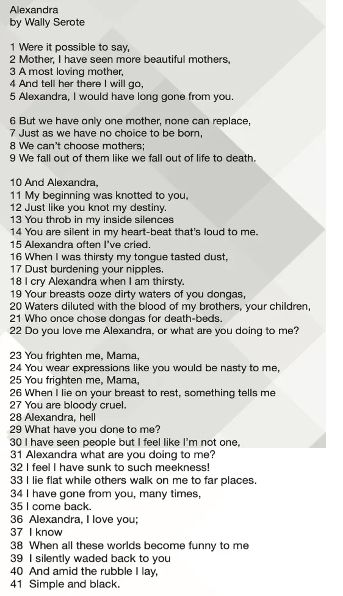Photo AI
Last Updated Sep 13, 2025
Alexandra by Mongane Wally Serote Simplified Revision Notes for NSC English FAL
Revision notes with simplified explanations to understand Alexandra by Mongane Wally Serote quickly and effectively.
497+ students studying
Alexandra by Mongane Wally Serote
Type and Form
- Alexandra is an example of protest poetry, drawing attention to inequality and social issues.
- It is written in free verse with no set rhyme scheme, pattern, or repetition.
- The stanzas and lines are uneven, reflecting the chaotic life in Alexandra.
Analysis
Title
- Alexandra refers to a black township in Johannesburg.
- It is personified as a cruel mother, shaping the speaker's life.

Lines 1-5
- Alexandra is personified as a mother.
- The speaker wishes he could leave but remains tied to Alexandra.
- Repetition of 'mother' highlights his bond with the township.
Lines 6-9
- The speaker acknowledges that one cannot choose their mother, just like they cannot choose their birthplace.
- Falling out of a mother = falling out of life → Inevitability of fate.
Lines 10-22
- The umbilical cord ('knot') symbolises the speaker's connection to Alexandra.
- Biblical reference (Psalm 139:13) → Suggests an unbreakable link.
- 'Your breasts ooze the dirty waters of your dongas' → Symbolises poverty, suffering, and violence in Alexandra.
Lines 23-31
- The speaker feels fear and uneasiness about Alexandra.
- Repetition of 'You frighten me, Mama' → Emphasises his mixed emotions.
- 'You are bloody cruel' → References violence and oppression in Alexandra.
Lines 32-39
- The speaker has tried to leave but always returns.
- 'I love you' → Despite its hardships, Alexandra is home.
- 'I waded back' → Returning is not easy but inevitable.
Lines 40-41
- The poem ends with the speaker accepting his fate.
- 'Amid the rubble I lay, Simple and black' → Represents his place in Alexandra's struggles.
Themes
Neglect and Cruelty
- Alexandra is compared to a mother who cannot care for her child.
- Lack of resources and poverty make life difficult for its residents.
Poverty, Squalor, and Destitution
- Alexandra is barren and covered in dust.
- 'Dirty waters of dongas' → Represents suffering, hardship, and death.
Attachment
- The speaker cannot escape Alexandra despite its cruelty.
- He feels at home in its struggles.
Black People's Quest for Identity
- Alexandra shaped who he is, no matter where he goes.
- The people of Alexandra struggle for survival and identity.
Violence and Death
- Alexandra is a place of constant violence and bloodshed.
- 'Bloody cruel' suggests the brutality of life in the township.
Diction and Figurative Language
Imagery
- 'Knotted' → Symbolises attachment and inescapability.
Apostrophe
- The speaker addresses Alexandra directly as if it were a person.
Metaphor/Personification
- 'Dust burdening your nipples' → Shacks compared to ripples.
- 'Your breasts ooze dirty waters' → Suggests poverty and hardship.
- 'We fall out of them like we fall out of life' → No choice in birth or death.
Repetition
- 'Mother' and 'Mama' → Shows deep connection to Alexandra.
- 'You frighten me, Mama' → Creates a sense of fear and uneasiness.
Rhetorical Questions
- 'Do you love me, Alexandra, or what are you doing to me?' → Seeks validation and reassurance.
Oxymoron
- 'Silent/loud' → Alexandra is always part of him, even if he cannot hear it.
Tone and Mood
Tone
- Accusing/Judgemental → Criticising Alexandra's hardships.
- Lamenting → Expressing sorrow over life in Alexandra.
Mood
- Somber and Sad → Reflects struggles and suffering.
500K+ Students Use These Powerful Tools to Master Alexandra by Mongane Wally Serote For their NSC Exams.
Enhance your understanding with flashcards, quizzes, and exams—designed to help you grasp key concepts, reinforce learning, and master any topic with confidence!
270 flashcards
Flashcards on Alexandra by Mongane Wally Serote
Revise key concepts with interactive flashcards.
Try English FAL Flashcards36 quizzes
Quizzes on Alexandra by Mongane Wally Serote
Test your knowledge with fun and engaging quizzes.
Try English FAL Quizzes29 questions
Exam questions on Alexandra by Mongane Wally Serote
Boost your confidence with real exam questions.
Try English FAL Questions27 exams created
Exam Builder on Alexandra by Mongane Wally Serote
Create custom exams across topics for better practice!
Try English FAL exam builder57 papers
Past Papers on Alexandra by Mongane Wally Serote
Practice past papers to reinforce exam experience.
Try English FAL Past PapersOther Revision Notes related to Alexandra by Mongane Wally Serote you should explore
Discover More Revision Notes Related to Alexandra by Mongane Wally Serote to Deepen Your Understanding and Improve Your Mastery
96%
114 rated
Voice of the Land
Everything Has Changed (Except Graves) by Mzi Mahola
264+ studying
195KViews